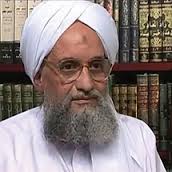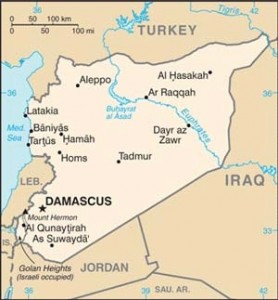Saturday 28 January 2017
Death of the USA's Syrian ‘Moderate’ Fantasy
Exclusive: Neocons and liberal hawks sold the fantasy that Syrian “moderate” rebels were a viable option when all they did was help arm Al Qaeda jihadists and worsen the bloodshed, as Jonathan Marshall explains.
By Jonathan Marshall
The neoconservative and liberal interventionist case for arming Syria’s rebels lost its last vestige of credibility this week with the routing of Free Syrian Army (FSA) forces by Al-Qaeda-linked Islamists in northwestern Syria.
U.S.-backed Syrian “moderate” rebels smile as they prepare to behead a 12-year-old boy (left), whose severed head is held aloft triumphantly in a later part of the video. [Screenshot from the YouTube video]
Washington think-tank warriors and editorial writers have long looked to the FSA as America’s natural allies in the Syrian conflict — so-called “moderates” unblemished by the Assad regime’s cruel record of repression, or the Islamists’ preference for cutting the throats of apostates.
In her memoir Hard Choices, former Secretary of State Hillary Clinton recounted her hope that “if the United States could train and equip a reliable and effective moderate rebel force, it could help hold the country together during a transition . . . and prevent ethnic cleansing and score settling.”
In much the same way, the Reagan administration hoped — and failed — to cultivate “moderate elements” in Iran’s army through its covert arms deals with Tehran in the mid-1980s. The truth of the matter — exposed again this week — is that the FSA and other “moderates” never had the popular support or the grit to take on more fanatical warriors in Syria.
On Tuesday, the Nusra Front, an Al Qaeda affiliate that rebranded itself last year as Jabhat Fateh al-Sham (JFS), attacked the FSA in Idlib and Aleppo provinces with heavy artillery, suicide bombs, and even cyber attacks. Within a day, they largely succeeded in wiping out local FSA forces.
JFS explained that it was punishing the FSA for “trying to divert the course of the revolution towards reconciliation with the criminal regime” of President Bashar al-Assad. The FSA recently joined other non-extremist rebel groups in Kazakhstan for inconclusive talks with the Syrian government.
If Washington had provided the FSA with portable anti-aircraft missiles, as advocated by influential interventionists like Charles Lister of the Middle East Institute, those dangerous weapons would now be in the hands of one of the most extreme and lethal factions fighting in Syria with the possibility that they could be used for terrorist purposes such as shooting down civilian airliners.
Similar debacles, complete with weapons transfers to extremists, have taken place many times over the past few years. In September 2013, FSA forces in the northern city of Raqqa surrendered abjectly to Islamists, despite outnumbering them. One top rebel commander said, “There is no such thing as the FSA [here]. We are all Al Qaeda now. Half of the FSA has been devoured by ISIS, and the other half joined Jabhat al-Nusra.”
Collaborating with Al Qaeda
Many FSA commanders learned their lesson and began to collaborate with Nusra Front, essentially fighting under Al Qaeda’s command. Those that steadfastly remained “moderate” paid a heavy price.
In September 2014, the Washington Post’s national security columnist David Ignatius described visiting the commander of Harakat al-Hazm, the largest CIA-vetted (i.e., “moderate”) rebel group in Syria. They had just been “chased from their headquarters” by Nusra Front, and forced to abandon their U.S.-provided anti-tank missiles and other lethal equipment.
“At some point, the Syrian street lost trust in the Free Syrian Army,” the despondent commander told Ignatius. He explained, as Ignatius put it, that “many rebel commanders aren’t disciplined, their fighters aren’t well-trained and the loose umbrella organization of the FSA lacks command and control. The extremists of the Islamic State and Jabhat al-Nusra have filled the vacuum.”
An Arab intelligence source confirmed to Ignatius, “the FSA is a kind of mafia. Everyone wants to be head. People inside Syria are tired of this mafia. There is no structure. It’s nothing.” Based on this experience, Ignatius declared flatly, “The problem is that the ‘moderate opposition’ that the United States is backing is still largely a fantasy.”
His conclusion was borne out a month later when Nusra Front vanquished the Western-backed Syrian Revolutionaries’ Front in Idlib province. Worse yet, the following summer, the Pentagon graduated 60 rebels, hand-picked and trained at a cost of half a billion dollars, only to have them fall apart and flee when attacked by Nusra Front.
One month after that debacle, another group of rebels handed over their U.S.-supplied trucks and ammunition to Nusra Front in exchange for safe passage — repeating the process of U.S. taxpayers arming Al Qaeda in the name of promoting “moderates.”
That pattern continues. Citing FSA officers, the ardent think-tank interventionist Thanassis Cambanis admits that “Nusra routinely harvests up to half the weapons supplied by the Friends of Syria, a collection of countries opposed to Assad, and has regularly smashed FSA factions that . . . Nusra thought were getting too strong or too popular.”
A Strategy That Backfired
In 2015, former Ambassador to Syria Robert Ford, who has long advocated a more muscular policy of arming moderate rebels against the Assad regime, confessed that the strategy had backfired.
“For a long time,” Ford said, “we have looked the other way while the Nusra Front and armed groups on the ground, some of whom are getting help from us, have coordinated in military operations against the regime. I think the days of us looking the other way are finished.”
Joshua Landis, the respected Syria expert and head of the Center for Middle East Studies at the University of Oklahoma, goes further and argues that trying to buy moderate allies with money and arms was doomed from the start.
As Landis told an interviewer recently, “Many activists and Washington think tankers argue that the reason the radicals won in Syria is because they were better funded than moderate militia . . . No evidence supports this. Radicals . . . fought better, had better strategic vision and were more popular. The notion that had Washington pumped billions of dollars to selected moderate militias, they would’ve killed the extremists and destroyed Assad’s regime, is bunkum.”
Bunkum it may be, but mainstream pundits continue to demand that Washington support anti-Assad forces in Syria — whether in the name of saving lives, fighting tyranny, or making life uncomfortable for the Russians. We can only hope that President Trump ignores them and confines his wars to Twitter.
Jonathan Marshall is author of many recent articles on arms issues, including “How World War III Could Start,” “NATO’s ProvocativeAnti-Russian Moves,” “Escalations in a New Cold War,” “Ticking Closer to Midnight,” and “Turkey’s Nukes: A Sum of All Fears.”
The views expressed in this article are the sole responsibility of the author and do not necessarily reflect those of the Blog!
Subscribe to:
Post Comments (Atom)



















No comments:
Post a Comment